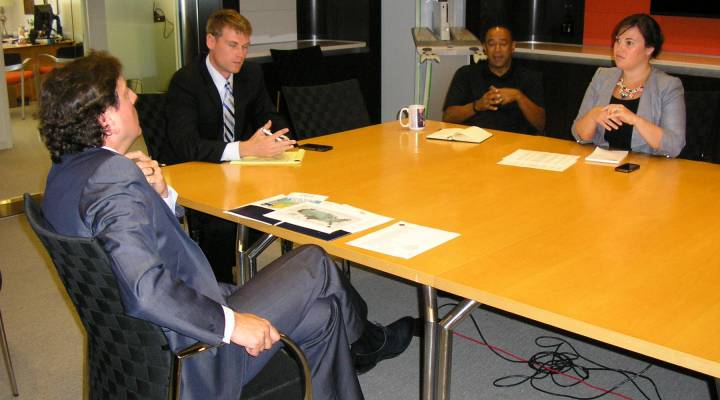
Video game lobby answers ‘call of duty’ on the Hill

Meet the voice of video game makers on Capitol Hill: Erik Huey.
A “Donkey Kong” champion and “Madden” addict, he’s now chief lobbyist for the Entertainment Software Association, the main trade group for the gaming business in Washington.
“I feel like Mario the fix-it man, the plumber, making sure things flow correctly. But I think more often than not, I feel like Sonic the Hedgehog, running around with frenetic energy,” he says.
Huey and his staff have just finished discussing a plan to highlight gaming industry jobs in congressional districts.
Now, Huey is off to the corridors of Capitol Hill, first to visit Rep. Joe Garcia, then Rep. Jim McGovern.
Members of Congress listen to Huey. The Center for Responsive Politics says the Entertainment Software Association spent almost $5.5 million on lobbying in 2013.
“That’s pretty serious lobbying money,” says Viveca Novak, a spokeswoman for the Center.
| The most prolific video game voice actress ever |
| The voice actor behind Mario looks back on his audition for the part |
Scrolling through spending reports, Novak says there was a spike in the video game lobby’s spending as Congress considered a bill mandating research into whether violent video games cause actual violence.
“Almost half of their reports in 2013 mentioned the Violent Content Research Act. It’s clearly something they were very concerned about,” says Novak.
The bill is now stalled in the Senate.
The video game industry has lobbied on online piracy and privacy, too. And it’s not just relying on shoe leather. The lobbyists are trying to get gamers to help make their case online. But it’s not easy.
“It’s a little bit like herding cats with a dog in the room,” says Andrew Rasiej, the founder of Personal Democracy Media, and chairman of an annual conference on politics and technology.

Gamers don’t always support the tech lobby’s positions. Still, Erik Huey says his association has organized about 600,000 gamers into a group called the Video Game Voters Network.
When a congressman recently made disparaging remarks about gaming, Huey says thousands of group members responded.
“Four thousand constituents calling in — that’s quite powerful,” he says.
Huey says when it works, the Video Game Voters Network can be a potent weapon. Most other lobbyists don’t have such an active, online base that’s used to combat. Or, at least virtual combat.
There’s a lot happening in the world. Through it all, Marketplace is here for you.
You rely on Marketplace to break down the world’s events and tell you how it affects you in a fact-based, approachable way. We rely on your financial support to keep making that possible.
Your donation today powers the independent journalism that you rely on. For just $5/month, you can help sustain Marketplace so we can keep reporting on the things that matter to you.


















